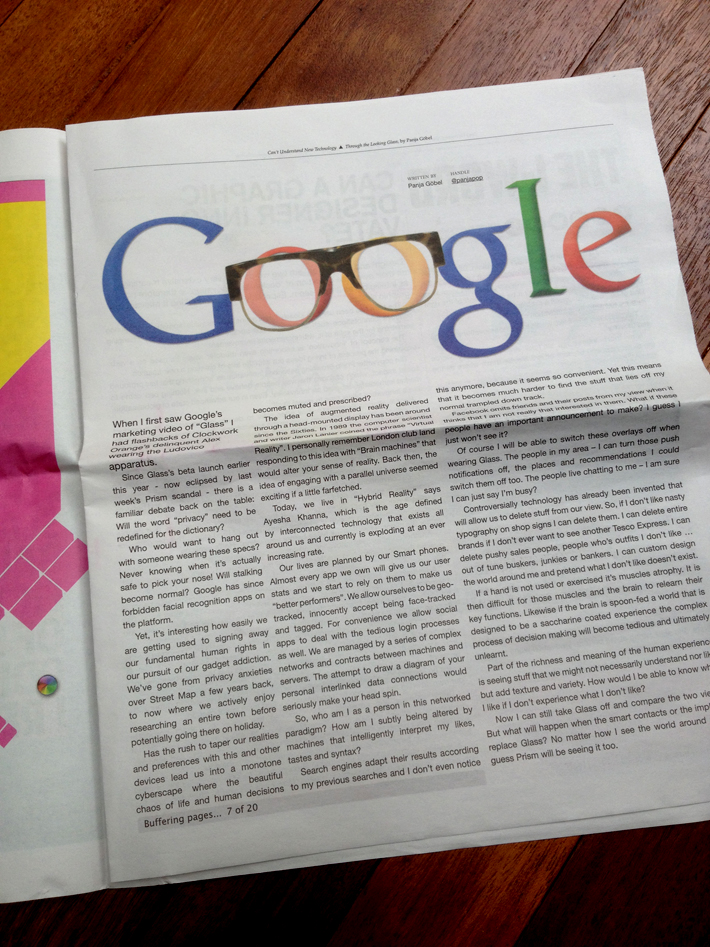Through The Looking Glass in Can’t Understand New Technology
|
I’ve written another piece for the print only paper Can’t Understand New Technology If you haven’t had a chance to get hold of one of the few copies in circulation you can read it here. – When I first saw Google’s marketing video of “Glass” I had flashbacks of Clockwork Orange’s delinquent Alex wearing the Ludovico apparatus. Since Glass’s Beta launch earlier this year and now eclypsed by last week’s Prism scandal there is a familiar debate back on the table: Will the word privacy need to be redefined for the dictionary? Who would want to hang out with someone wearing these specs? Never knowing when it’s actually safe to pick your nose! Will stalking become normal? Google since has forbidden facial recognition apps on the platform. Didn’t we have these same anxieties with Street map a few years back? Now we enjoy researching an entire town before potentially going there on holiday. It’s interesting how easy we are getting used to signing away our fundamental human rights in the pursuit to fuel of our gadget addiction. Has the rush to taper our realities and preferences with this and other devices lead us into a monotone cyber scape where the beautiful chaos of life and human decisions becomes muted and prescribed? The idea of augmented reality delivered through a head mounted display has been around since the sixties. In 1989 the computer scientist and writer Jaron Lanier coined the phrase “Virtual Reality”. I personally remember London club land responding to this idea with “Brain machines” that would alter your sense of reality. Then the idea of engaging with a parallel universe seemed exciting if a little farfetched. We live in “Hybrid Reality” says Ayesha Khanna, which is the age defined by interconnected technology that exists all around us and currently is exploding at an ever increasing rate. Our lives are planned by our Smart phones. Almost every app we own will give us our user stats and we start to like, use and rely on them to make us “better performers”. We allow ourselves to be geo tracked, innocently accept being face tracked and tagged. For convenience we allow social apps to deal with the tedious login processes as well. We are managed by a series of complex networks and contracts between machines and servers. The attempt to draw a diagram of your personal interlinked data connections would seriously make your head spin. So, who am I as a person in this networked paradigm? How am I subtly being altered by machines that intelligently interpret my likes, tastes and syntax? Search engines adapt their results according to my previous searches and I don’t even notice this anymore, because it seems so convenient. Yet this means that it becomes much harder to find the stuff that lies off my normal trampled down track. Facebook omits friends and their posts from my view when it thinks that I am not really that interested in them. What if these people have an interesting important announcement to make? I guess I just wont see it? Of course I will be able to switch these overlays off when wearing Glass. The people in my area – I can turn those geo push notifications off, the places and recommendations I could switch them off too. The people live chatting to me – I am sure I can just say I’m busy? Controversially technology has already been invented that will allow us to delete stuff from our view. So, if I don’t like nasty typography on shop signs I can delete them. I can delete entire brands if I don’t ever want to see another Tesco Express. I can delete pushy sales people, people who’s outfits I don’t like …out of tune buskers, junkies or bankers. I can custom design the world around me and pretend what I don’t like doesn’t exist. If a hand is not used or exercised it’s muscles atrophy. It is then difficult for those muscles and the brain to relearn their key functions. Likewise if the brain is spoon-fed a world that is designed to be a saccharine coated experience the complex process of decision making will become tedious and ultimately unlearnt. Part of the richness and meaning of the human experience is seeing stuff that we might not necessarily understand nor like but add texture and variety. How would I be able to know what I like if I don’t experience what I don’t like? Now I can still take Glass off and compare the two views. But what will happen when the smart contacts or the implants replace Glass? No matter how I see the world around me, I guess Prism will be seeing it too. |
